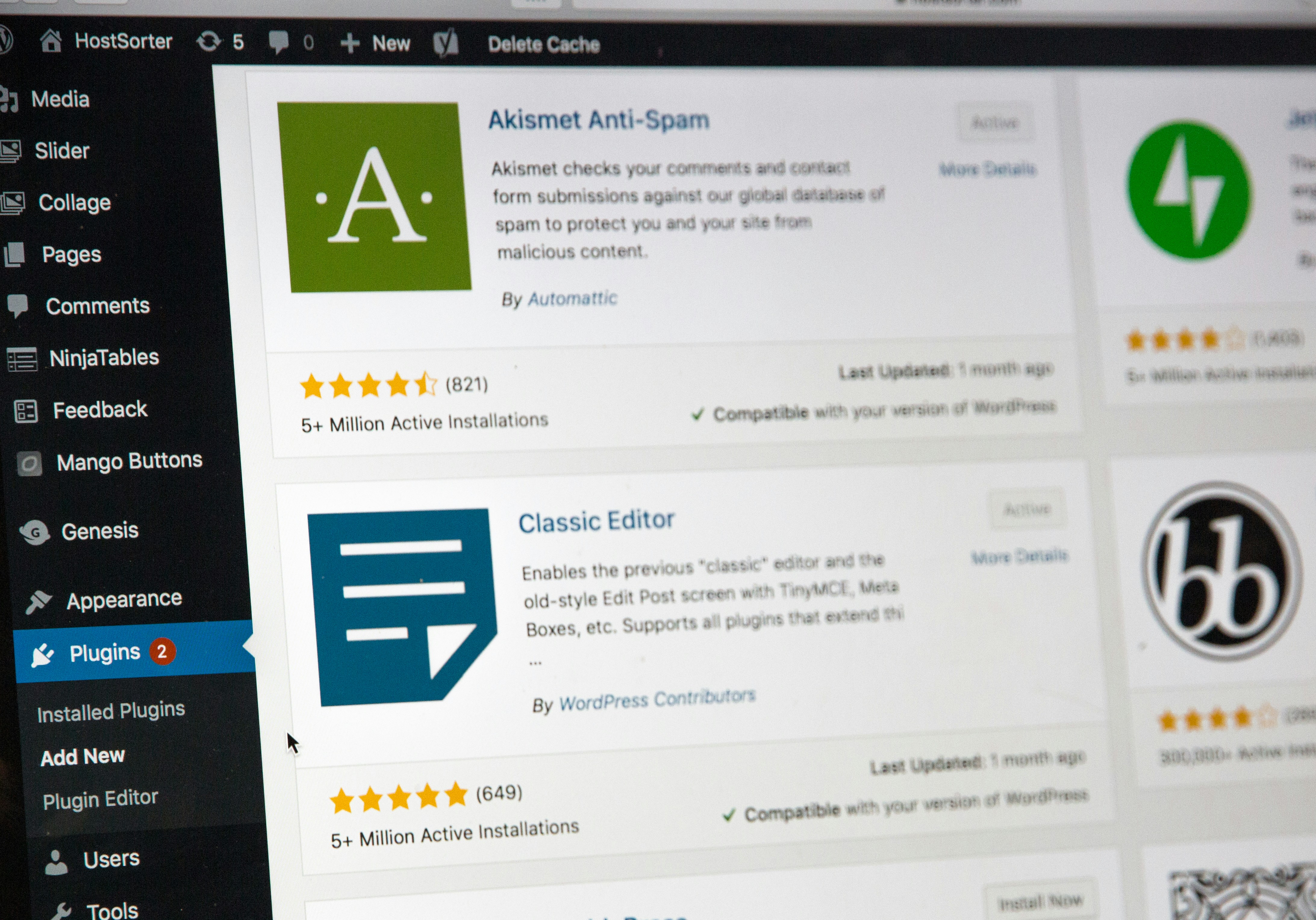Stop Believing These 5 WordPress Myths
- WordPress isn’t always the best choice for your website
- The more plug-ins you need, the greater your risk of danger
- Despite popular belief, WordPress websites are not built with SEO in mind
- A good theme and stack of plug-ins are not a substitute for a developer
- Yes, you do need to manage your WordPress website
With 38.2% of all websites built on WordPress, the platform is the most popular CMS (content management system) that exists today. It’s a favorite for everything from a millennial travel blog to larger corporate websites.
On the surface, it makes sense. WordPress is free, easy to use, and highly customizable — if you don’t know how to build a feature, there’s always a plug-in. But it’s these factors that actually make WordPress a worse choice for many businesses.
Think of it this way: Building your marketing or e-commerce site on WordPress is a bit like buying an airstream to enter a drag race. Airstreams are great at what they do but they’re not built for being a primary vehicle, especially not one that you’re depending on to win races or be fast.
To understand why WordPress isn’t the best choice for all websites, let’s demystify 5 of the most common myths (starting with that one).
Myth 1: WordPress is the Best Choice for All Websites
The reason? WordPress on its own has pretty limited functionality. If you just want to build a website to host your resume, a bio and a blog, WordPress is perfect for you. After all, it was released as a blogging platform in the early ‘00s.
But if you need to do anything more in-depth — like create forms to collect leads, process credit cards, or set up an e-commerce store — you’ll rely on plug-ins. While they’re promoted as a core feature of WordPress, they come with a whole host of other issues — which we’ll get into in a second.
If you need to rely on a thick stack of plug-ins to build out all the core functionalities of your website, you’re setting yourself up for trouble. Building a website on a stack of plug-ins is like building a city on reclaimed land right on a major fault line. Your site may function well most of the time — but the one time a major update happens, your website will crumble like San Francisco in 1906.
Myth 2: The More WordPress Plug-ins The Merrier
Plug-ins are a core feature of WordPress, touted as a simple way for anyone to build out features on their website. The message is that you don’t have to be a dev — just choose any of the tens of thousands of options available. Whether you need something fairly simple like the ability to create forms or something more complex like a live chat, there’s a snippet of code you can purchase and just, erm, plug in to your website.
The issue is that each plug-in you install alters the code on a website. It sounds obvious, but it has a larger significance than you might realize. Every time you alter your website’s underlying code, you’re creating an opportunity for error.
One major grievance with plug-ins is that each one is developed in a vacuum. They’re engineered to play well with WordPress, but they’re built without regard for the varied slate of other plug-ins your site may be using.
Every time you install a new plug-in, you run the risk of adding two who don’t play well together, just like Hamilton and Burr. Just like their conflict ended in death, the plug-in duel could end up crashing your site.
And if they don’t kill your site completely, they will grind the page speed to a crawl. The order in which elements of your website load may end in a different kind of brawl, in which the two plug-ins fight to be the first to load. As the plug-ins are going about their deathmatch, your website just … stalls. And it’s been well documented that slow websites are a death-knell for businesses.
The slower your website, the more customers will leave and never come back — which causes your SEO rankings to drop, leading to fewer customers finding your website, and a horrible circle of death ensues.
Each plug-in also creates an additional door for hackers to gain access to your website through vulnerabilities in the code. . When those plug-ins become outdated, it’s like telling all the questionable folks online that your parents are out of town — and there’s a huge party at your place.
Using a couple of plug-ins isn’t a major problem. But adding more and more to the stack turns your website into a house of cards. Every subsequent addition risks bringing your whole system crashing down.
Myth 3: WordPress Websites are built for SEO
Word on the streets is that WordPress is the best platform for SEO. But that’s not exactly true. The problem comes back to plug-ins, once again. As mentioned in the previous myth, plug-ins can bring your site speed to a crawl. User experience and website speeds are already a major factor in your rankings — and they’re about to become more critical.
WordPress is also known for introducing a host of technical errors into a website — the largest of which is related to categorization. When multiple categories exist on your website, WordPress will create a url in each category for each blog. This means a single blog on your website may have 5 or 6 URLS. This leads to keyword cannibalization and index bloat — both of which can cause your site’s rankings to plummet.
Finally, this may sound pedantic, but we’ll say it anyway: SEO knowledge cannot be replaced with a plug-in. When it comes to wooing Google, SEO plug-ins are like the pickup artists at the club. Sure, their lines and general bullshit may work on one or two keywords, but it won’t do anything for the rest because Google is not impressed.
Myth 4: You Don’t Need a Developer Because You Have WordPress
The beauty and frustration with WordPress lie in it’s open source, barebones structure. You can install a theme to customize the look and feel of your website. For the custom features, you can install a plug-in. So why would you need a developer?
As discussed under the problem with plug-ins section, each of these ancillary applications is built in a silo. You really have no idea how well the plug-ins will work with each existing element of your website. The resulting struggle can slow your site down — or crash it completely.
You also need to stay on top of constant updates for WordPress, your theme, and every plug-in. Failing to do so puts your website at risk for hacks, and increases the likelihood that those bits of code will come into conflict. (It will also add to your constantly compounding tech debt).
A skilled developer can help you customize your website without all the plug-ins, which means much cleaner code, a higher likelihood that all of your customizations will work together, and smoother updates in the future.
Myth 5: WordPress is Set-it-and-Forget-it
WordPress might be easier to manage, but that doesn’t mean you can go without management. WordPress, your theme, and every plug-in will need regular updates, and all at different times. Keeping up on these updates is painful enough. But the risk of not staying on top of updates is even worse.
Failing to stay on top of updates means you’re increasing your risk of hackers exploiting vulnerabilities in outdated plug-ins, along with the lesser problem of reduced functionality. Outdated plug-ins also increase the risk of a platform update seriously crashing your website.
Or, in the case of WordPress 5.5, the update itself could conflict with existing elements on your website and cause the entire thing to fall off a cliff.
Compounding this problem, WordPress doesn’t automatically back-up your site. So, if your house of cards collapses, you might be up a creek without a paddle.
The Takeaway
WordPress is the most popular content management system because it is customizable and easy to use. But beneath the surface is a host of issues.
If you run a blog, or a similar website, WordPress is probably a solid choice. But if you run a more sophisticated website that requires customizations that would mean a large number of plug-ins, you should reconsider.
If you’d like to learn more about alternatives to WordPress — or ‘90s video games — get in touch. Our custom development and technical consulting services can help you figure out the best choice for your website, whether you choose to have us build it (we’d love that!), or go with someone else.


